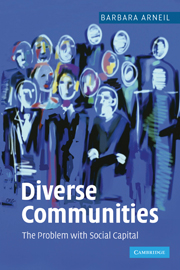Book contents
- Frontmatter
- Contents
- List of abbreviations
- Acknowledgements
- 1 Social capital, justice and diversity: an introduction
- 2 The Progressive Era: past paradise?
- 3 The present malaise in civic participation: empirical and normative dimensions
- 4 The causes of ‘decline’ in social capital theory
- 5 Civic trust and shared norms
- 6 Beyond Bowling Alone: social capital in twenty-first-century America
- 7 Justice in diverse communities: lessons for the future
- References
- Index
7 - Justice in diverse communities: lessons for the future
Published online by Cambridge University Press: 22 September 2009
- Frontmatter
- Contents
- List of abbreviations
- Acknowledgements
- 1 Social capital, justice and diversity: an introduction
- 2 The Progressive Era: past paradise?
- 3 The present malaise in civic participation: empirical and normative dimensions
- 4 The causes of ‘decline’ in social capital theory
- 5 Civic trust and shared norms
- 6 Beyond Bowling Alone: social capital in twenty-first-century America
- 7 Justice in diverse communities: lessons for the future
- References
- Index
Summary
We began this book by considering two different definitions of ‘social capital’; the instrumental, aggregative and functionalist definition of ‘capital’ (participation and trust) provided by the ‘American’ school (Coleman and Putnam), versus the more critical, historical perspective (networks and resources) of the ‘European’ school (Gramsci and Bourdieu). According to the former school of thought, investment in social capital is apolitical (since it exists outside the realm of the state), functional (since it serves larger ends), aggregative (since it is simply the sum of the number of individual decisions to connect) and positive (for democracy and individual well-being). As individuals choose to increase the number of connections in their community, higher levels of trust, solidarity and generalized reciprocity will result, and these can be quantitatively measured; in turn, such increased connectedness will result in better neighbourhoods, greater economic prosperity, more health and happiness for individuals and stronger democracies. It is for these instrumental and aggregative reasons that social capital and social connectedness are seen as largely positive by Coleman and Putnam.
For all the emphasis on civic society and community in Putnam's thesis, at the end of the day the central units of analysis of this ‘capital’ are, in essence, the individual (whose interests, ‘rightly understood’, are being served by increasing cooperation) and the American nation (the democratic health of which depends upon the ‘civic culture’ in which it is rooted and the degree to which it is unified).
- Type
- Chapter
- Information
- Diverse CommunitiesThe Problem with Social Capital, pp. 200 - 240Publisher: Cambridge University PressPrint publication year: 2006



